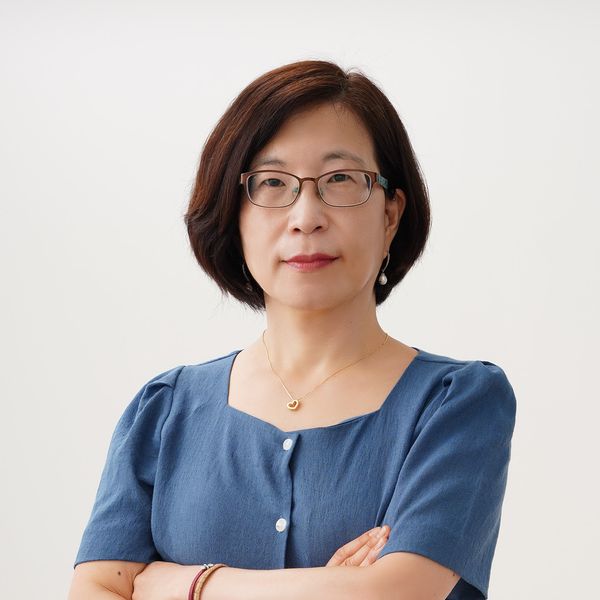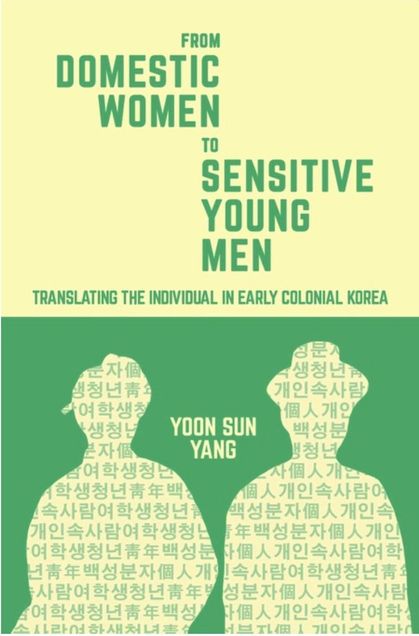BU Humanists at Work: Yoon Sun Yang, Associate Professor of Korean & Comparative Literature
“How do I convince English-speaking readers of the value of the literary works that were once celebrated as innovative but no longer easily satisfy contemporary aesthetic tastes?”

This was the question at the forefront of Yoon Sun Yang’s mind as she took to writing From Domestic Women to Sensitive Young Men: Translating the Individual in Early Colonial Korea. An Associate Professor of Korean and Comparative Literature, Yang was introduced to the genre she considers the “early colonial domestic novel”—a short-lived era characterized by a departure from pre-modern literary practices—in her undergraduate studies. She was immediately drawn to these texts. “They didn’t look like anything I had read thus far,” she said. “They were quirky, hilarious, and remarkably thought-provoking.”
Yang’s book, which explores notions of identity, gender, and modernity, takes readers through the historical period from which the early colonial domestic novel emerged. Yang demonstrates how these novels can inform us about “a chaotic period when many existing values were put into question.” The growing influence of Japanese colonial censorship also shaped the genre, forcing male authors to “portray their desires for modernization with the domestic space, instead of the public sphere, as their primary setting.” While previous scholars awarded little literary value to this era of writing, Yang explores the conventions that might have made the genre “groundbreaking” to Korean readers at the turn of the twentieth century.

In particular, Yang explores the stories of women who assert their limited agency “while still being defined by their roles in the family as wives, daughters, and mothers.” These women take action by prioritizing education, selecting life partners against external pressures, and supporting other women. “These figures’ pursuit of selfhood is, thus, inseparable from their sense of belonging to a family and often blended with collective desires,” said Yang. The female characters imagine their “individual” rights not by cutting off their communal ties but by forming or redefining their relationships with their communities. This approach reflects how the term individual was translated into Korean in the late nineteenth century.
“The notion of the individual has been continuously translated and retranslated into Korean in dialogue with changing cultural and political milieus,” Yang says. However, she notes that no iteration is necessarily more or less valid than the others. “My point is, instead, that individuality is still open to new interpretations and imaginations.”
To Yang, this openness is the key to approaching literature with students in her courses. “I understand and teach Korean literature not as a self-standing entity but as a vantage point to see the world differently.” Female figures from early colonial domestic novels may seem to fall behind when compared with contemporary European and North American feminist icons. Yang finds it “more productive to ask how male and female characters in these novels engage with various epoch-making changes” and explore what new insights they offer to twenty-first-century global readers, who have been exposed to some contemporary aspects of Korean culture due to its growing influence.
For Yang, carefully translating Korean literature into English is one way to bring forward subtle nuances and complexities of the original texts that may not be apparent to English-speaking readers. “Translation has always been an integral part of my research, as both a concept and a practice,” says Yang. Understanding Korean literature from this period requires knowledge of the surrounding cultures and languages, as many early-twentieth-century Korean writers were avid readers and translators of Chinese, Japanese, and Western works.
“Colonial Korean literature reveals aspects of Japan that might not be readily visible in Japanese literature,” says Yang. Post-1945 Korean literature provides a perspective into America’s role in East Asia during and after the US’s three-year-long occupation of the Southern part of the Korean peninsula between 1945 and 1948 and the Korean War (1950–1953). Therefore, her courses include a small number of Korean American literary works or English translations of Japanese language works by ethnic Korean writers under Japan’s colonial rule or Zanichi writers in post-1945 Japan.
This impulse to explore Asian literary texts beyond the confinement of national boundaries also inspired Yang’s approach to the Global Asian Literary Studies lecture series. Launched in 2023, this series expands upon previous years’ New Books in East Asian Literature series. The New Books in East Asian Literature series was meant to encourage dialogue between East Asian literary scholars, but Yang realized that these scholars “converse with and intervene in various global literary and cultural issues, debates, and paradigms.” She hopes that in turning toward the global, the series will allow for new links among various Asian literary traditions within and outside of Asia.
Yang has some advice for those who want to learn more about global literature: “I encourage my students to imagine living in a different place and time.” Literature may help readers expand their understandings of other cultures and allow them to connect with people from another time and place with empathy.